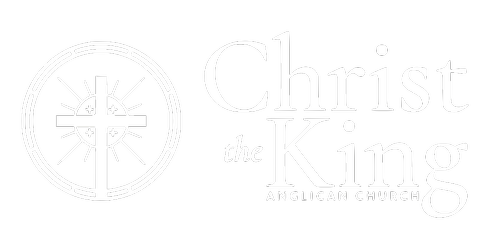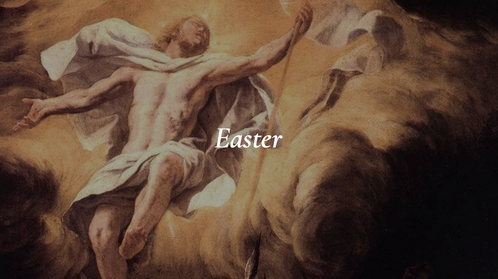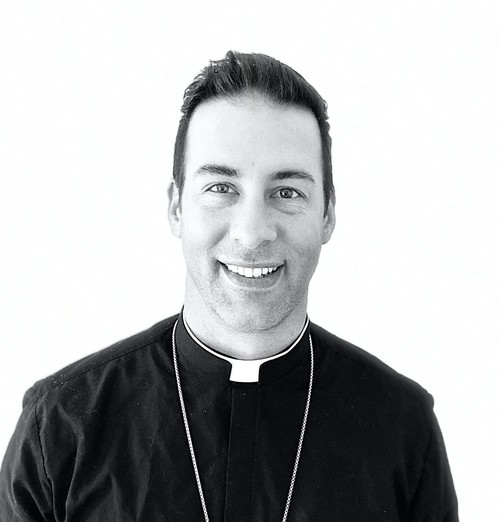For Anglicans, Easter is not just one special Sunday from which we quickly move on, but rather it is an entire season, lasting 50 days (thus, Easter's fifty days is greater than Lent's forty). As a celebration of our Lord's resurrection, the season of Easter is characterized by great joy and hope, as we look back on Christ's triumph over sin and death as well as ahead towards the promise of the resurrection of our own bodies. For Christians, death is not the end. Alleluia!
At the Easter Vigil, we hear the singing of the Exultet, an ancient chant that relates the victory of Christ over Death to the Old Testament stories of the Passover and the Exodus. Consider this excerpt from the Exultet:
For this is indeed the Paschal feast
where in that very lamb is slain, and by his blood the door posts are hallowed.
The night is come where in thou didst bring our fathers,
the children of Israel, out of Egypt, through the Red Sea,
and didst make them to pass through its waters dry shod.
Wherefore the night is come
wherein were driven away the shades of sin by the light of the fiery pillar.
O thrice blessed night, in which Egypt is utterly destroyed
and the Hebrews come forth in triumph;
night in which the heavenly things are joined into the earthly.
The night is come wherein even now
the believers in Christ throughout the whole universe,
set free from the evil of the world and the darkness of sin,
are restored to grace and knit together in holiness.
The night is come where in Christ has burst the bonds of death,
and from the grave is risen again in triumph.
For to be born into the world hath protected us nothing,
except we had been redeemed.
O wonderous condescension,
thy loving mercy towards us!
O inestimable love of a fatherly compassion:
to redeem the rebel servant thou didst give thine only Son!
O truly blessed night which alone was witness of the hour and season
where in Christ did perfect his Resurrection!
The night has come where of it is written,
“The night is as clear as the day,” and,
“Then shall my night be turned to day in my joy and gladness.”
Therefore through the sanctifying power of this holy night
wickedness fleeth, sin is purged,
and innocence restored to the fallen, and joy to the sorrowful;
hatred vanishes, concord reigneth, and low laid is tyranny.
Consider how the references to the Passover and the Exodus help us better understand the significance of Easter. Christians have understood the events of Easter through these lenses from the very beginning (see, for a famous example from the church fathers, Melito of Sardis' On Pascha), so it's worth exploring these connections in more detail!
As we move towards the end of the Easter season, for which the color is white, we discover three days of great importance for the liturgical year: Ascension Day, Pentecost, and Trinity Sunday. The feast of the Ascension is celebrated 40 days after Easter, and marks when Jesus was taken up into heaven and seated at the right hand of the Father, indicating that “God has highly exalted him and bestowed on him the name that is above every name” (Phil 2:9). Christ’s ascension is of particular importance for us at Christ the King because this celebration of Christ’s kingship is the closest thing our church has to a patronal feast day.
The feast of Pentecost follows 50 days after Easter, commemorating the descent of the Holy Spirit on Jesus’ followers and the birth of the church in Jerusalem. Pentecost marks the end of the Easter season and the beginning of what is sometimes called “ordinary time,” which we can think of as “God’s great green growing season.” Pentecost Sunday is a particularly appropriate day for baptisms and confirmations. The color for Pentecost is red.
Finally, the Sunday immediately following Pentecost is known as Trinity Sunday, on which we reflect on the mystery of God being Father, Son, and Holy Spirit. In the 1928 BCP, Sundays that follow Trinity are named for how many weeks they fall after Trinity Sunday, until we arrive at the “Sunday Next Before Advent,” when the entire cycle of the liturgical year begins again.
Linking together Ascension Day, Pentecost, and Trinity Sunday is the importance of the Holy Spirit. Just before his ascension, Christ promised his followers that he would send them the Holy Spirit, who would empower them to be his witnesses in all the earth (Acts 1:8). In fact, His Ascension is what brings about the sending of the Holy Spirit. Jesus says in John 16:7, “It is to your advantage that I go away, for if I do not go away, the Helper will not come to you. But if I go, I will send him to you.” At Pentecost, we see the arrival of the Holy Spirit in wind and fire (Acts 2:2-3). This completes the revelation of God as Three in One, and the indwelling of the Spirit unites us with the life and joy of the Triune God! We celebrate both of these things on Trinity Sunday.
As our focus turns over the course of these weeks to the person and work of the Spirit, consider Jesus’ key teaching on the Holy Spirit in John 16:5-15. What functions does Jesus ascribe to the Holy Spirit? What would Christianity be like if there were no Holy Spirit?
But now I am going to him who sent me, and none of you asks me, ‘Where are you going?’ But because I have said these things to you, sorrow has filled your heart. Nevertheless, I tell you the truth: it is to your advantage that I go away, for if I do not go away, the Helper will not come to you. But if I go, I will send him to you. And when he comes, he will convict the world concerning sin and righteousness and judgment: concerning sin, because they do not believe in me; concerning righteousness, because I go to the Father, and you will see me no longer; concerning judgment, because the ruler of this world is judged.
“I still have many things to say to you, but you cannot bear them now. When the Spirit of truth comes, he will guide you into all the truth, for he will not speak on his own authority, but whatever he hears he will speak, and he will declare to you the things that are to come. He will glorify me, for he will take what is mine and declare it to you. All that the Father has is mine; therefore I said that he will take what is mine and declare it to you.
At the Easter Vigil, we hear the singing of the Exultet, an ancient chant that relates the victory of Christ over Death to the Old Testament stories of the Passover and the Exodus. Consider this excerpt from the Exultet:
For this is indeed the Paschal feast
where in that very lamb is slain, and by his blood the door posts are hallowed.
The night is come where in thou didst bring our fathers,
the children of Israel, out of Egypt, through the Red Sea,
and didst make them to pass through its waters dry shod.
Wherefore the night is come
wherein were driven away the shades of sin by the light of the fiery pillar.
O thrice blessed night, in which Egypt is utterly destroyed
and the Hebrews come forth in triumph;
night in which the heavenly things are joined into the earthly.
The night is come wherein even now
the believers in Christ throughout the whole universe,
set free from the evil of the world and the darkness of sin,
are restored to grace and knit together in holiness.
The night is come where in Christ has burst the bonds of death,
and from the grave is risen again in triumph.
For to be born into the world hath protected us nothing,
except we had been redeemed.
O wonderous condescension,
thy loving mercy towards us!
O inestimable love of a fatherly compassion:
to redeem the rebel servant thou didst give thine only Son!
O truly blessed night which alone was witness of the hour and season
where in Christ did perfect his Resurrection!
The night has come where of it is written,
“The night is as clear as the day,” and,
“Then shall my night be turned to day in my joy and gladness.”
Therefore through the sanctifying power of this holy night
wickedness fleeth, sin is purged,
and innocence restored to the fallen, and joy to the sorrowful;
hatred vanishes, concord reigneth, and low laid is tyranny.
Consider how the references to the Passover and the Exodus help us better understand the significance of Easter. Christians have understood the events of Easter through these lenses from the very beginning (see, for a famous example from the church fathers, Melito of Sardis' On Pascha), so it's worth exploring these connections in more detail!
As we move towards the end of the Easter season, for which the color is white, we discover three days of great importance for the liturgical year: Ascension Day, Pentecost, and Trinity Sunday. The feast of the Ascension is celebrated 40 days after Easter, and marks when Jesus was taken up into heaven and seated at the right hand of the Father, indicating that “God has highly exalted him and bestowed on him the name that is above every name” (Phil 2:9). Christ’s ascension is of particular importance for us at Christ the King because this celebration of Christ’s kingship is the closest thing our church has to a patronal feast day.
The feast of Pentecost follows 50 days after Easter, commemorating the descent of the Holy Spirit on Jesus’ followers and the birth of the church in Jerusalem. Pentecost marks the end of the Easter season and the beginning of what is sometimes called “ordinary time,” which we can think of as “God’s great green growing season.” Pentecost Sunday is a particularly appropriate day for baptisms and confirmations. The color for Pentecost is red.
Finally, the Sunday immediately following Pentecost is known as Trinity Sunday, on which we reflect on the mystery of God being Father, Son, and Holy Spirit. In the 1928 BCP, Sundays that follow Trinity are named for how many weeks they fall after Trinity Sunday, until we arrive at the “Sunday Next Before Advent,” when the entire cycle of the liturgical year begins again.
Linking together Ascension Day, Pentecost, and Trinity Sunday is the importance of the Holy Spirit. Just before his ascension, Christ promised his followers that he would send them the Holy Spirit, who would empower them to be his witnesses in all the earth (Acts 1:8). In fact, His Ascension is what brings about the sending of the Holy Spirit. Jesus says in John 16:7, “It is to your advantage that I go away, for if I do not go away, the Helper will not come to you. But if I go, I will send him to you.” At Pentecost, we see the arrival of the Holy Spirit in wind and fire (Acts 2:2-3). This completes the revelation of God as Three in One, and the indwelling of the Spirit unites us with the life and joy of the Triune God! We celebrate both of these things on Trinity Sunday.
As our focus turns over the course of these weeks to the person and work of the Spirit, consider Jesus’ key teaching on the Holy Spirit in John 16:5-15. What functions does Jesus ascribe to the Holy Spirit? What would Christianity be like if there were no Holy Spirit?
But now I am going to him who sent me, and none of you asks me, ‘Where are you going?’ But because I have said these things to you, sorrow has filled your heart. Nevertheless, I tell you the truth: it is to your advantage that I go away, for if I do not go away, the Helper will not come to you. But if I go, I will send him to you. And when he comes, he will convict the world concerning sin and righteousness and judgment: concerning sin, because they do not believe in me; concerning righteousness, because I go to the Father, and you will see me no longer; concerning judgment, because the ruler of this world is judged.
“I still have many things to say to you, but you cannot bear them now. When the Spirit of truth comes, he will guide you into all the truth, for he will not speak on his own authority, but whatever he hears he will speak, and he will declare to you the things that are to come. He will glorify me, for he will take what is mine and declare it to you. All that the Father has is mine; therefore I said that he will take what is mine and declare it to you.
You can learn more about Easter by watching our catechesis video on the topic.
Contact a spiritual director
Easter is when many find their faith again. If you'd like to contact any of our spiritual directors at Christ the King, simply click the images below.




